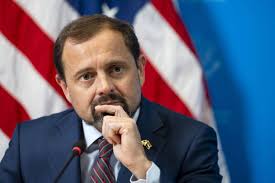What brought Mr. Tom Periello to Geneva?
By Abdelhafeez Maryood

Although many celebrated the U.S. envoy Tom Periello’s invitation to the conflicting parties in Sudan to come to the Geneva platform in hopes of resolving the Sudanese crisis, the call—issued through the media before reaching those directly involved—ultimately revealed two sobering realities. First, the United States, as an institution, appears not to be fully committed to ending the prolonged conflict that has engulfed Sudan for the past year and a half. The second, reinforcing this notion, is evident in the selection of an envoy: a political activist lacking both the experience and nuanced understanding required to effectively navigate Sudan’s complex crisis and create a truly actionable negotiation platform.
While Tom Periello does hold a doctorate in law from Yale University, has served in Congress, and contributed to U.S. initiatives in Africa’s Great Lakes region, his grasp of the Sudanese conflict’s intricate dynamics has rendered his mediation efforts among the least successful in recent memory. This failure highlights a fundamental flaw in America’s broader approach to the Third World. Perlow seems to have operated under the longstanding American assumption of possessing a “magic wand”—a belief that, through regional allies, the U.S. can handle even the most complex situations. This approach typically relies on leveraging influence through a combination of pressure, incentives, and intimidation, aiming to ultimately steer outcomes to America’s advantage. However, this approach has not borne fruit in Sudan, revealing the limits of America’s one-size-fits-all strategy.
In the Sudanese crisis, the United States has leaned heavily on its ally, Egypt—an approach complicated by Egypt’s historical misreading of Sudan’s affairs. Over time, Egypt has consistently taken a misguided path in addressing Sudanese issues. What stands out this time, however, is Egypt’s new role as an advisor, mirroring its earlier reliance on Britain during the Mahdist revolution. The key similarity in both cases is the miscalculation of Sudan’s complexities. Historically, when the Mahdist revolution posed a threat to Khedivial Egypt, then under British influence, Britain engaged Egypt in resolving the situation. This involvement led to General Gordon’s appointment to address the Mahdist uprising and curb the slave trade. However, this misjudged intervention culminated in General Gordon’s death and the eventual withdrawal of Khedivial Egypt from Sudan—illustrating the persistent consequences of underestimating Sudan’s intricate political landscape.
Currently, Egypt is predictably struggling to assess the evolving situation in Sudan. The United States, perceiving Egypt as closely connected to the Sudanese crisis, has positioned it as an advisor. This dynamic has left U.S. envoy Tom Perlow, with limited insight into Sudan’s complexities, effectively under the sway of Egypt’s Assistant Foreign Minister, Hossam Eisa. Egypt has openly backed the Islamic Movement-aligned Sudanese military, led by Abdel Fattah al-Burhan—a stance reiterated by Egypt’s foreign ministry. Consequently, with Perlow under Eisa’s influence, the Geneva platform’s search for genuine solutions may resemble Al-Maari’s elusive phoenix: a pursuit doomed to remain perpetually out of reach.
Upon Periello’s invitation, international partners gathered in Geneva, though he had not secured the attendance of both disputing parties. The Rapid Support Forces (RSF) eventually showed up, temporarily salvaging the platform. However, the partners soon realized they were at a table with no set agenda, as Perlow lacked both a clear vision and a strategy. When al-Burhan’s army of the Islamic Movement declined to attend, the partners began to see the futility of waiting. Perlow then abruptly left Geneva, flying—following an Egyptian plan—to meet the army delegation in El Alamein, Egypt. Yet even this effort collapsed when Egypt canceled the meeting, citing a “protocol breach” by the Sudanese Armed Forces (SAF) delegation. Perlow returned to Geneva, while the RSF used the opportunity to establish agreements with international organizations for humanitarian aid delivery to Darfur and Kordofan, utilizing the Chadian “Adre” crossing, controlled by the RSF, as well as the “Dabba” crossing.
The Political activist Tom Periello, known for his media enthusiasm, appeared eager to comment on every minor and major development. Yet, despite his extensive engagements—from meetings with heads of state connected to the Sudanese crisis to his participation in UN discussions—no official statement emerged from the Geneva platform. This highlights Perlow’s limited political acumen regarding the region and the Sudanese crisis, revealing his role as that of a fledgling activist more focused on public attention than on substantive progress, seemingly chasing likes and followers rather than viable solutions.
The complex crisis in Sudan remains challenging to resolve, complicated further by Egypt’s confused approach, which has failed to learn from past missteps. Egypt seems to believe that backing the idealistic visions of Islamist factions can halt the inevitable tide of change in Sudan. Yet, this war marks the beginning of a profound transformation—one that promises to dismantle the old Sudan.
- * Sudanese Political Writer & analyst.




